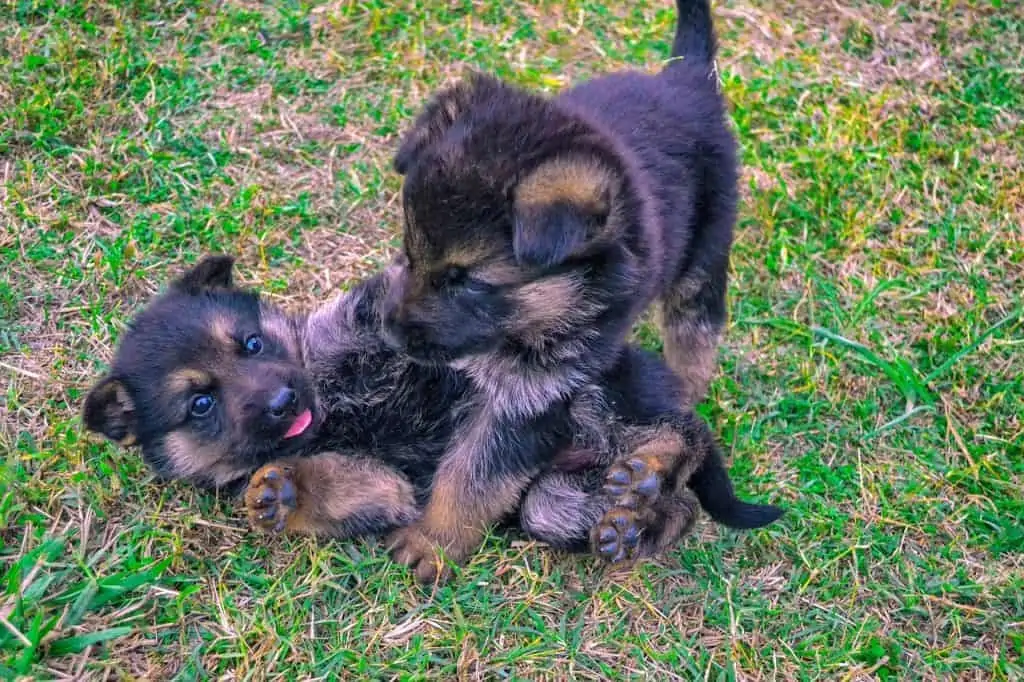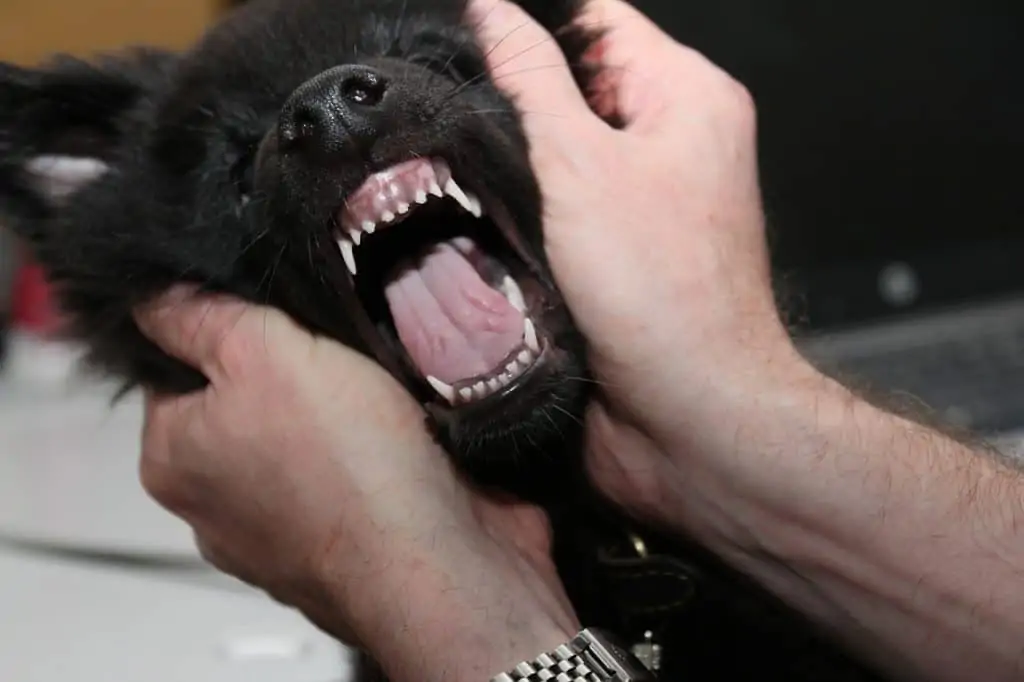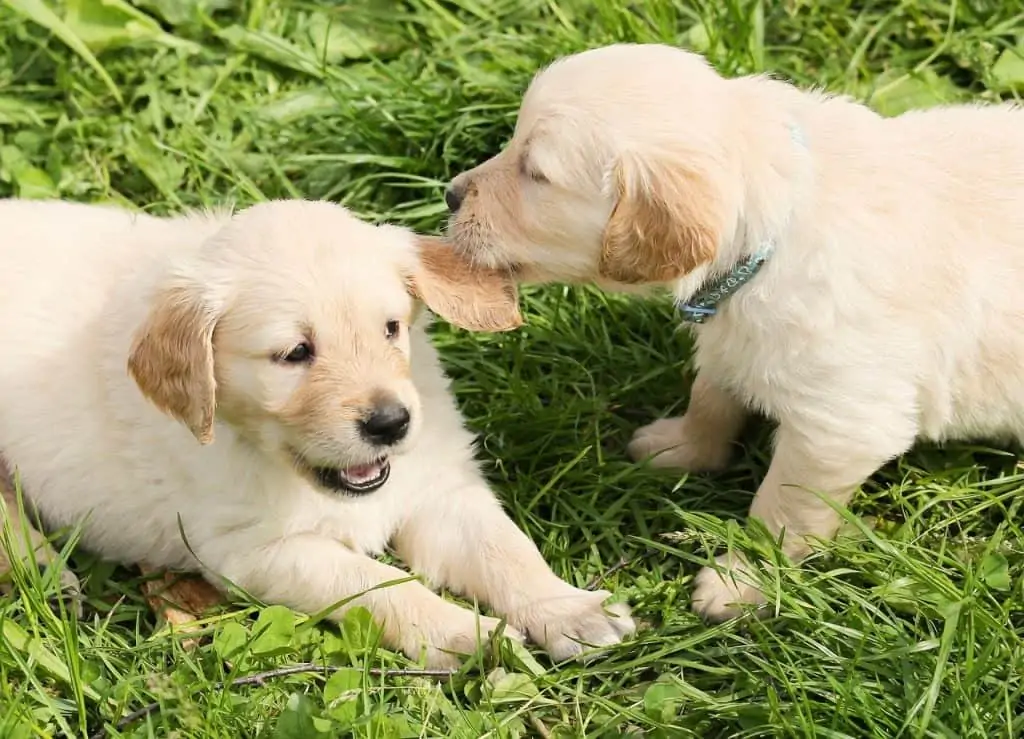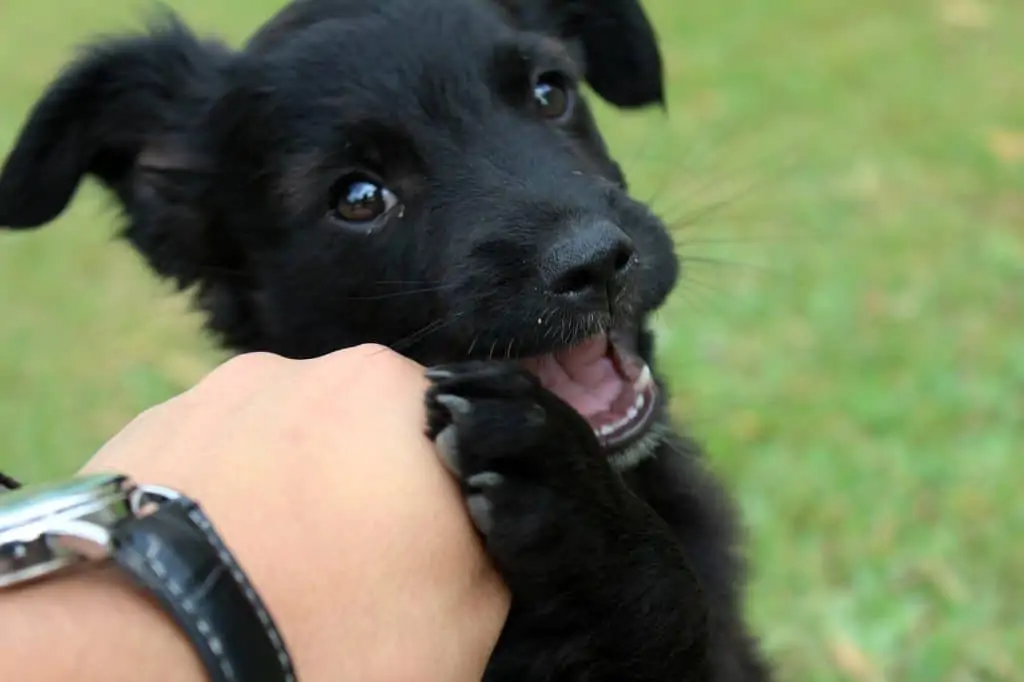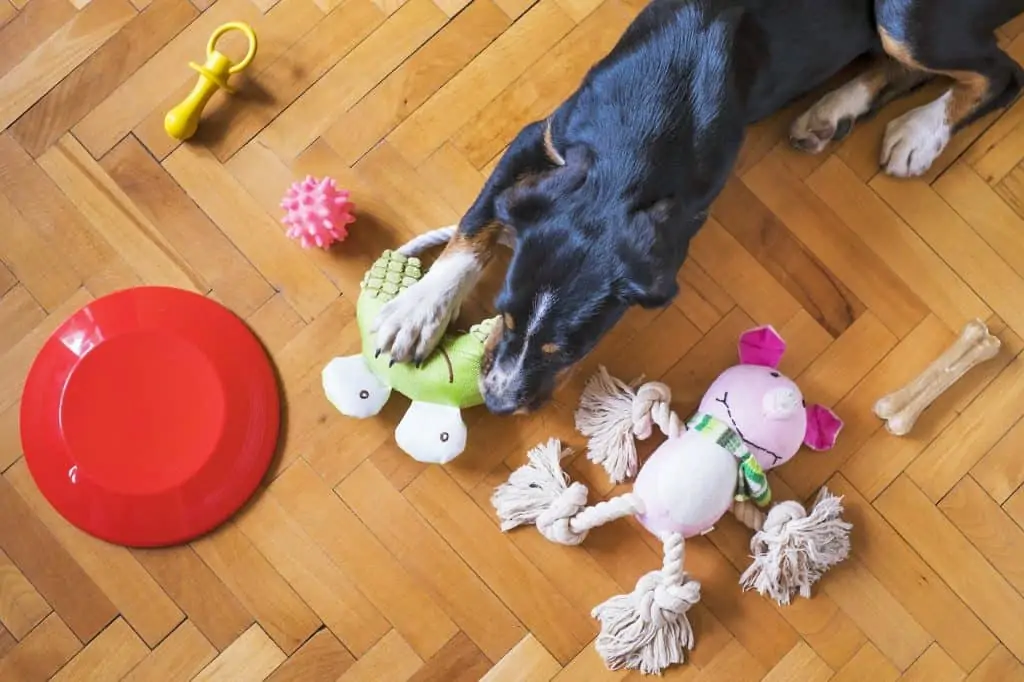When do puppies stop biting?
This is a common question we get from many of our clients who are new to puppy parenthood.
While most of us can agree that puppies are ridiculously adorable, we can also agree it’s not so adorable when they sink their needle-like teeth into our skin. Ouch!
While puppy biting is a completely normal part of puppyhood, it’s also frustrating and painful. So, when do puppies stop biting and how can you teach a puppy to cool it sooner than later?
That’s what we’re here to discuss. But before we dive, let’s first take a look at the normal stages of puppyhood.
Keep reading.
Contents
When Do Puppies Stop Biting – The Normal Stages Of Puppyhood
Biting and mouthing are common behaviors in puppies during puppyhood.
According to a variety of experts and studies, there are several stages of puppyhood. Each of these stages are essential to your puppy’s overall health and development, and it’s important you not only understand these stages, but understand why the behaviors of these stages are natural.
Knowing these stages will help you understand why you’re asking when do puppies stop biting and will also offer you insight as to why practicing patience and positive reinforcement during training sessions are key.
When Do Puppies Stop Biting – The Stages Of Puppyhood
- Stage 1: Birth to 13 Days Old – Neonatal Period
The Neonatal Period is the stage in which your puppy is born and lasts up until he is about two weeks of age. You don’t have to wonder when do puppies stop biting during this stage for a couple of reasons.
First, you’re not going to be with your puppy during this time. Newborn puppies this young should not be separated from their mother or littermates, as this can lead to a variety of health and behavioral issues down the road.
Second, a puppy this young doesn’t have any teeth. Besides, he’s going to be much more interested in snuggling with mom and his furry siblings than biting anything just yet.
- Stage 2: 13 Days to 21 Days Old – Transitional Period
The Transitional Period of puppyhood is the time your puppy transitions from a furry little lump to a full blown puppy. He’ll start opening his eyes, his first set of baby teeth will begin to erupt, and he’ll start exploring the world around him with a bit more confidence.
- Stage 3: 21 Days to 49 Days Old – Canine Socialization Period
Canine socialization is your puppy’s first venture into learning how to be a dog. It is during this stage in his life when he is learning the proper ways to play with his littermates.
This is around the time puppies learn to play bite, and their siblings and mother will teach them what is too hard and what is too rough.
This is an essential part of your puppy learning the answer to when do puppies stop biting.
- Stage 4: 7 to 12 Weeks Old – Human Socialization Period
Your puppy is ready to go home, and just in time for you to begin wondering about when do puppies stop biting. Even though they learned how to play bite with their siblings and mother, they are still getting used to not using those needle-sharp teeth on their human family.
It’s up to you to socialize your puppy and teach him that your fingers and toes are not chew toys.
- Stage 5: 12 Weeks to 16 Weeks Old – Seniority Classification Period (Ranking Period)
When do puppies stop biting? It’s usually around this period when they start to figure it out. While they are still going to be nibbling and chewing, the seniority classification period (also known as the ranking period) is where they determine who’s boss.
To help your puppy learn to respect you, you should also respect him and the way he learns and communicates. Use positive reinforcement training techniques and try to learn basic canine body language so you can better understand what makes your puppy tick.
Doing this will help when it comes to you setting boundaries and teaching your puppy when to use his mouth appropriately.
- Stage 6: 4 Months to 18 Months Old – Flight Instinct Period (Your Puppy’s Adolescent Stage)
No matter the species, the teen phase seems to be a dreadful one. Puppies go through a defiant phase of life called the Flight Instinct Period. During this time, they seem to regress in their training and test the boundaries.
Their puppy teeth are gone at this point, but that won’t stop them from testing their jaw strength on your hands, clothes or ankles from time to time.
Be patient with your puppy, and don’t get discouraged. It may seem like you should have already passed the “when do puppies stop biting” phase of puppy parenthood, but this stage is normal.
Soon, your puppy will be an adult and will have fully grown out of this seriously trying stage of adolescence.
When Do Puppies Stop Biting? Let’s Talk About Puppy Teething
Like humans, dogs go through a teething phase when they are young.
Now that we’ve talked about puppy stages, it’s time to talk about teething.
For many people, teething is something you only consider with human children. But puppies actually go through a teething phase too.
This is an especially important topic to cover when you’re looking into when puppies stop biting because a teething puppy is going to bite and he’s going to bite everything he can get his mouth on.
This is natural and normal, and should be taken in stride.
That’s because just like human infants, puppies go through a phase when their puppy teeth erupt. They will eventually lose these puppy teeth and their adult teeth will appear.
During this time, a puppy’s teeth and gums are sore and they’ll be looking for anything and everything to alleviate this strange sensation.
Teething toys can aid in your quest to find out when do puppies stop biting. That’s because these toys can help reduce the chances of your puppy chewing something else he shouldn’t to get relief, as can ensuring you keep a close eye on your puppy during this teething phase.
Zzanggu Rubber Teething Toys
No products found.
Some of our favorite puppy teething toys to look into when you’re wondering when do puppies stop biting are the Zzanggu Rubber Teething Toys for puppies listed above. These toys are designed for puppies to gnaw on during their sensitive teething stage and they help to reduce pain, soreness and itchiness of gums.
The toys are also safe for young puppies and made of quality, dog-approved materials. Of course, take them away once your puppy gets older, as these toys are soft and could be easily destroyed by adult dogs.
So, when does teething start and when do puppies stop biting?
According to the American Kennel club, teething begins at two weeks of age and will not be complete until your puppy is around six months old.
However, there is a small window of time where your puppy’s gums will be especially sensitive. It’s during this time, (between 12 and 16 weeks to be exact) when your puppy will be most prone to chewing and biting.
Here’s a timeline for a teething puppy you should consider when considering when do puppies stop biting:
- 2 to 4 Weeks
Puppies this young do not have their teeth just yet. Though their eyes have opened and they are beginning to become more active, they are still nursing and gummy.
- 5 to 6 Weeks
On average, puppy’s have about 28 baby teeth. By the time your puppy is five to six weeks old, all of these baby teeth should have erupted. Unfortunately, these teeth are sharp as needles and your puppy likes to use them. Lucky for mom, most breeders begin weaning puppies from nursing around this age.
- 12 to 16 Weeks
Puppies are not old enough to be separated from their mom and go to their forever home until they are at least 7 weeks of age. This means you might already have your puppy by the time he is 12 to 16 weeks.
Around this time, your puppy will begin losing his baby teeth and you’ll notice a lot of chewing and biting. Provide your puppy with puppy-approved teething toys and keep a close eye on him to ensure he’s not chewing anything dangerous or inappropriate.
- 6 Months
By six months of age, your puppy should have all of his adult teeth. Most dogs have around 42 teeth in total. If you notice that your puppy still has some baby teeth in his mouth, experts recommend making a trip to the vet.
While most puppy teeth fall out on their own, it is possible for some to remain in the mouth and require professional extraction from a vet.
At six months, your puppy may still be a bit mouthy. However, he’ll be slowing down and you should soon be getting an answer soon as to when do puppies stop biting.
Is My Puppy Biting Or Playing? The Difference Between Play and Aggression
All puppies are mouthy to a point, but it’s important to know the difference between aggressive tendencies and normal behavior or play.
If you’re wondering when do puppies stop biting, you might also be wondering if this biting is playful or aggressive.
There is a difference between play biting and aggressive biting, but it’s hard to always tell when you’re dealing with a puppy.
As dogs age, they should also develop a sense of bite inhibition. This inhibition gives them excellent control over their jaw strength and allows them to decide how much pressure to apply behind a bite.
This is an amazing trait that all dogs maintain, and it can be cultivated with proper training and socialization with your dog at an early age.
However, if a dog is not properly trained or socialized, he may not develop a sound bite inhibition instinct. Furthermore, some dogs can take longer to learn about bite inhibition than some of their other canine counterparts.
With that said, not all puppies that bite hard or draw blood are being aggressive. Puppies especially are learning about the power behind their bite.
So, when looking into when do puppies stop biting, it’s a good idea for owners to have some basic understanding of the difference between canine aggression and play biting.
When Do Puppies Stop Biting – Recognizing Normal Play Behaviors In Puppies
Normal play behavior in puppies can vary depending on the puppy’s age and breed. However, when wondering when do puppies stop biting, try and identify normal play behavior for your specific dog.
Most normal play behavior includes common body language signs that communicate to other dogs that your puppy is playing with them. If you learn to read these body signals, you too will be able to better determine whether or not your puppy is play biting.
Some normal play signals include:
- A loosely wagging tail
- A floppy body
- A relaxed or happy facial expression
- The play bow (when your dog lays down with his bum in the air)
- Rolling on the back
- Leaping, jumping or swatting
- Playfully growling or barking
When Do Puppies Stop Biting – Recognizing Aggressive Behaviors in puppies
In the dog world, play often mimics fighting. This means that biting, jumping, and rolling around with other dogs is common. This can also play a role in you wondering when do puppies stop biting, because they may always “bite” in some instances of play.
However, you can tell the difference between play biting and aggressive biting if you know what to look for. Some examples of a dog in stress or a dog exhibiting dominant or aggressive behaviors include:
- Resource guarding (growling, snapping or stiffening up around food or toys)
- An unnaturally high prey drive (relentlessly chasing or nipping other animals or smaller pets)
- An unwillingness to engage with you normally
- Growling, nipping or biting when you try to pet him or pick him up
It’s important to note here that all dogs and puppies, regardless of breed or mix, can be prone to aggressive tendencies, especially if they are not properly trained during puppyhood.
When looking into when do puppies stop biting, we want to remind you that puppies won’t just stop biting on their own.
They must undergo proper training, socialization and bit inhibition work with their mother and littermates, and then with their human family members once they go to their forever home.
When Do Puppies Stop Biting? Tips On Training and Bite Inhibition
Puppies must be trained on bite inhibition, so it’s up to you to help your puppy learn to stop biting.
Puppies are mouthy, and this is completely normal. But when do puppies stop biting and being so mouthy?
While the phase does seem to take forever, the good news is that puppy biting generally slows down between the ages of 8 and 10 months.
And by the time your dog is between one and two years old, you’ll likely be through with wondering when do puppies stop biting.
Of course, training is important before your puppy is an adult. As we mentioned above, the key to fully getting through the “when do puppies stop biting” phase of puppy parenthood begins with you teaching your puppy bite inhibition.
Training A Puppy
It’s never too early or to begin training your puppy. Training should be done using positive reinforcement techniques like treats and praise. Avoid punishing your puppy during training sessions as these kinds of tactics have been shown to reduce the rate at which your puppy learns.
Using treats and praise not only helps keep your puppy’s attention, but it also helps strengthen the bond between you and your dog.
Most importantly, training your puppy early and constantly using positive reinforcement can teach him a variety of lessons including self control, bite inhibition, structure and manners.
Training is also good for puppies on an emotional level, as it keeps them mentally engaged and happy. In order to keep training especially productive and to help you on your quest to find out when do puppies stop biting, we recommend using quality training treats.
Zuke’s Mini Training Treats
No products found.
Zuke’s Mini Training treats are ideal for puppies and dogs who are undergoing daily training sessions because they are small and low in calories. These treats are also highly palatable for dogs, meaning they will help you hold your puppy’s attention during sessions.
Most importantly, these training treats are made with high quality ingredients, so you won’t feel guilty about dishing them out each time your puppy makes you proud.
Of course, training isn’t the only thing you’ll need to do when raising a puppy. Socialization is also key to answering when do puppies stop biting.
Socializing A Puppy
Dogs go through what is known as a fear period during puppyhood. This period begins around 8 weeks and can last up until about 11 weeks of age. This is right around the time you will likely have acquired your puppy, as reputable breeders will not sell puppies younger than seven weeks old.
During this time, puppies are learning what is safe and what is not safe in the world around them. They make these judgements based on their environment and experiences.
For this reason, ensuring your puppy has as many positive first-time experiences during this period as possible is going to ensure he grows up happy, healthy and well-rounded.
A well socialized puppy is also a puppy who is less likely to bite as he ages. Dogs who have been properly socialized are generally more confident and have less anxiety, meaning they are less prone to fear-based aggressive tendencies.
When Puppy Biting Is A Concern – Reasons Why Your Puppy Won’t Stop Biting
Puppies begin learning bite inhibition from their mother and littermates. If a puppy is removed from his mother too soon, he could have behavioral issues down the road.
While all puppies are naturally mouthy, there are times when puppy biting can become problematic. In nearly all cases, there is an underlying cause to why your puppy won’t stop biting.
It’s important to try and get to the bottom of why your puppy won’t stop biting so you can work on correcting the issue.
Some common reasons a puppy may not stop biting include:
A Puppy Being Taken From His Mother and Littermates Too Early
When do puppies stop biting? They typically stop around 10 months of age. However, if your puppy was separated from his mother and litter before seven weeks of age, the answer to when do puppies stop biting could be a bit more complicated.
A puppy’s healthy development from 0 to 7 weeks relies heavily on his mother and littermates, as it is them who will help teach your puppy how to behave in appropriate ways. This is during your puppy’s canine socialization period, afterall.
A Puppy Who Has Not Been Trained On Bite Inhibition
If you’re looking into when do puppies stop biting and your dog has passed that 10 month mark, chances are your puppy was not properly trained on bite inhibition. Don’t worry, it is never too late to train or socialize a puppy or an adult dog.
Simply do plenty of research and get to work using positive reinforcement training techniques as we mentioned above.
A Puppy Who Is Still Teething And Is Not Provided The Appropriate Outlets
Teething puppies that are not provided the appropriate toys or equipment are much more prone to biting inappropriately.
Remember, teething puppies go through a stage where their gums are extremely sore, so you’ll need to work to provide your puppy with something appropriate to chew on. If you don’t, anything and everything in your home will be up for grabs.
An Overstimulated Puppy
Remember, puppies are mouthy by instinct. They commonly bite throughout the day. However, if your puppy is overstimulated and under exercised, he may be overly invested in trying to bite or chew.
This could be a sign of boredom or even exhaustion. Like children, puppies do best on a schedule. Set specific times to ensure your puppy is eating, sleeping, playing and exercising.
This will help not only answer “when will puppies stop biting” but it will also help reduce other behavioral issues as well.
A Puppy Who Is Fearful Or Aggressive
Fearful or aggressive puppies are often puppies who were not properly socialized. However, they can also be puppies or dogs who have experienced trauma at some point in their lives, especially during their fear period.
Like people, dogs can suffer from Post Traumatic Stress Disorder. PTSD in dogs can cause a wide variety of symptoms like fear, stress, anxiety and even inappropriate biting or chewing.
You can work with your puppy or dog who struggles with these behavioral issues by contacting a veterinarian behaviorist or professional dog trainer that specializes in dogs who have experienced trauma.
Tips On Reducing Puppy Biting Through All The Phases
Ensuring your puppy has plenty of chew-approved dog toys is key to helping him learn what is appropriate to bite and what isn’t.
Yes, puppy biting is normal, but that doesn’t mean it’s fun for you. Luckily, there are a few ways you can go about reducing the pain of puppy biting and ensuring your puppy’s teeth are landing on the appropriate things (i.e. toys, chews, etc).
So, while we know the answer to “when do puppies stop biting” is around 10 months, there are a few ways you can work to speed up the process.
Avoid Using Your Hands Or Fingers As A Toy
We’ve all been guilty of doing this, especially when our puppies are very, very young. When you first get your puppy and he’s not very strong, it’s tempting to wiggle your fingers in front of his little face and let him chew and suck on your hands.
Unfortunately, it won’t be long before that tiny puppy has grown in size and developed some jaw strength, and you’ll soon be regretting the fact that you taught him to see your hand as a chew toy.
Use Appropriate Dog Toys And Encourage Healthy Play With Your Puppy
Even if you don’t purposefully use your fingers or hands as early toys for your puppy, chances are he will still try and nibble on your fingers, (or toes, or ankles or shoes) from time to time. Instead of sitting around wondering “when do puppies stop biting?” and waiting for this phase to end, redirect your puppy with an appropriate toy.
Encourage him with praise when he goes from your hands to his toy, and continue to engage with him the right way.
If Your Puppy Does Become Mouthy, Do Not Jerk Your Hand, Arm, Fingers etc Away
Jerking your hand, arm, fingers, or anything else away that your puppy is nibbling or biting will not only cause more damage to what’s being chewed on, but it may lead to your puppy thinking this is a game.
He will likely continue trying to bite what he shouldn’t in an attempt to keep playing. Slowly remove what your puppy shouldn’t be biting and replace it with an appropriate toy or chew.
Do Not Slap, Flick, Hit Or Thump A Puppy For Biting – This Can Make The Issue Worse
When questioning when do puppies stop biting, the last thing you want to do is try and force your puppy to stop by using pain. This can lead to a puppy behaving fearfully or aggressively towards you in the future, which can lead to actual bites down the road.
Instead, work with your puppy on his level. Learn basic canine body language and use positive reinforcement techniques, and keep up with routine training and socialization as your puppy grows up.
And remember, mouthing is a natural and healthy part of puppyhood. Be patient, work with your puppy with love and consistency, and you’ll soon be out of this painful stage.
Best of luck and thanks for reading!
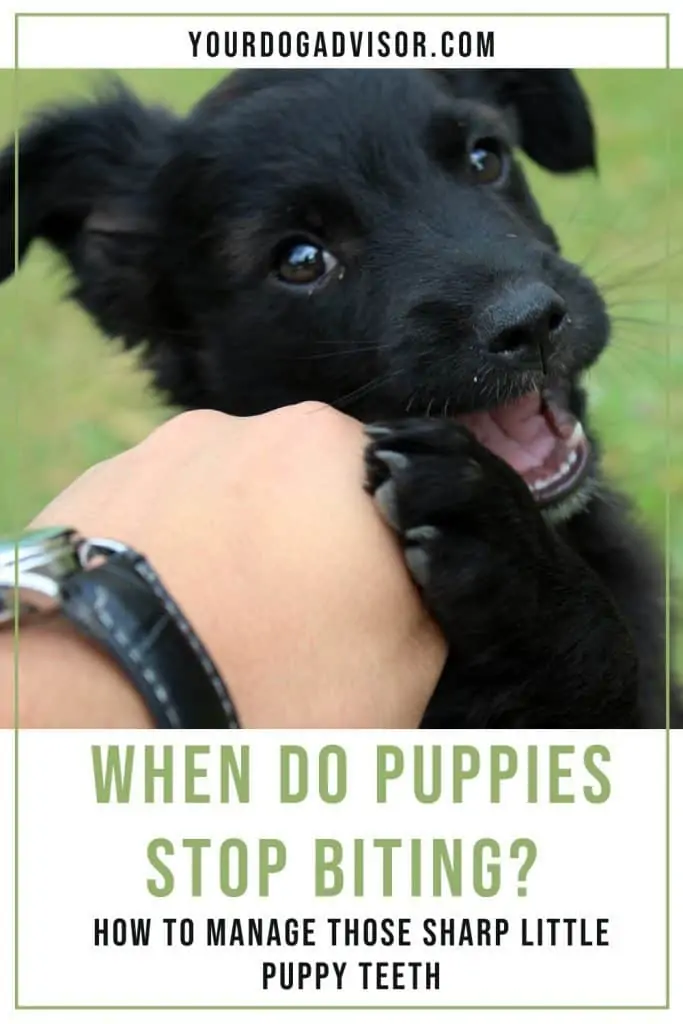

Jen Jones is a professional dog trainer and behavior specialist with more than 25 years of experience. As the founder of ‘Your Dog Advisor’ and the ‘Canine Connection’ rehabilitation center, she applies a holistic, empathetic approach, aiming to address root causes rather than merely treating symptoms.
Well known for her intuitive and compassionate approach, Jen adopts scientifically-proven, reward-based methods, encouraging positive reinforcement over punishment. Jen specializes in obedience training, behavior modification, and puppy socialization. Her innovative methods, particularly in addressing anxiety and aggression issues, have been widely recognized. Jen has worked with many of the world’s leading dog behaviorists and in her free time volunteers with local animal shelters and rescue groups.
